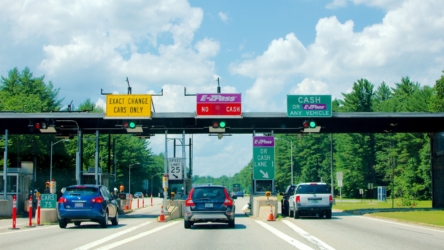We want to share with you an opinion piece about the New Hampshire Road Usage Bill (House Bill 478 and House Bill 1649) and whether or not it sends the right message to owners of fuel efficient cars. We would love to hear your thoughts on this.
Here are the thoughts of Peter Somssich andCathy Corkery:
Many residents know firsthand that New Hampshire’s roads and bridges are in need of significant funds for maintenance and safety improvements. Most state lawmakers are also well aware of this situation. However, when it comes to actually raising revenue for that purpose, courage and straight talk is a rare commodity.
There are three primary ways to raise revenue for infrastructure: gas taxes, road tolls and registration fees. House Bill 478 (a carry-over bill to be voted on this week) and House Bill 1649 (a 2020 bill, with a hearing scheduled for later this month but almost identical to HB 478), will charge a new “road use” fee in addition to the annual car registration fee for all passenger vehicles that are fuel-efficient. That means the better miles-per-gallon rating your vehicle has, the more you pay – up to $125 more annually.
Even though, it is called a road use fee, the new fee is not based on the damage your car does to the road per mile or by weight. It does not matter if you drive your vehicle 5,000 miles or 25,000 miles annually. Heavier vehicles, like SUVs, dump trucks or 18-wheelers, which cause far more damage to roads, are all exempted. The bills simply say that if your car gets 20 miles per gallon or more, you will pay more every year.
Of course, there are many benefits to driving a vehicle that fuel-efficient. Cars are a major source of air pollution. Benefits like less pollution for every mile driven, gasoline conservation and reducing fossil fuel dependency help make our communities safe and healthy, especially for vulnerable people, like children and the elderly. Diesel and conventional gasoline vehicles are a major source of carbon pollution, accounting for 50% of all carbon emissions and increasing the risks of the climate crisis. Therefore, any car that will lower unsafe air and carbon pollution, improves our public health and lowers the risks of the climate crisis.
Passing these bills would be the same as taxing people who don’t buy enough alcohol, cigarettes or lottery tickets each year. Those revenues fund programs for everyone, so would some residents not be paying their fair share? Of course not.
Both HB 478 and HB 1649 demand a premium for “missing” gas tax revenues, and in doing so claw back air quality standards and make consumers pay for it, physically and literally. All owners of passenger vehicles, but especially fuel-efficient vehicles, would pay an extra registration surcharge for not consuming enough gasoline.
Whether intentionally or not, both bills are fossil fuel protection bills. In fact, according to a recent article in the Sierra Club magazine, the fossil fuel industry has been promoting the concept of “road usage fee” bills nationwide in an attempt to protect the fossil fuel industry.
Everyone recognizes that revenue from the gas tax has and will continue to decline. And we agree with the sponsors of HB 478 and HB 1649 about the urgent need for the state to receive more funding for road and bridge maintenance projects. But not at the expense of our public health. The two major causes of wear and tear on our roads and bridges are the weight of a vehicle and the annual miles traveled; the bills do not address either of these causes.
In an effort to find a solution, we support an alternative, HB 1650, sponsored by Representative Somssich. It proposes using both the weight (currently used to determine the registration fee) and actual miles traveled to determine the actual road usage to the registration fee. The bill also adjusts those fees to any changes made by the Environmental Protection Agency on the MPG annual average. Regardless of whether you drive an all-electric or a gas-powered vehicle, if you weigh something you should pay something under this bill, and if you use our roadways more, you should pay more than someone who travels less.
HB 478 or HB 1649 send the wrong message about New Hampshire’s priorities. They encourage inefficiency, unhealthy air pollution, carbon pollution and are unfair to car owners. If you agree, please contact your local state representative this week and ask that they oppose HB 478 and HB 1649 as written and consider, instead, HB 1650.
The content in this piece does not include views from the NARFA Team, and was published in the NH Business Review on January 7, 2020.
Recent Posts
The U.S. Department of Labor Announces Proposed Rule To Protect Indoor, Outdoor Workers From Extreme Heat
The U.S. Department of Labor has proposed a new rule aimed at protecting workers from extreme heat hazards. This initiative seeks to safeguard approximately 36 [...]
Supreme Court Overturns Chevron Deference: What It Means for Workplace Safety and Regulation
The landscape of federal regulation is set for a seismic shift following a recent Supreme Court decision. On June 28, in Loper Bright Enterprises, et [...]
Navigating the Compliance Maze: How NARFA Simplifies Employee Benefits for Automotive and Trade Industries
In today's complex regulatory environment, businesses in the automotive, roads, fuel, and related industries face unprecedented challenges in managing employee benefits. Recent studies show that [...]




